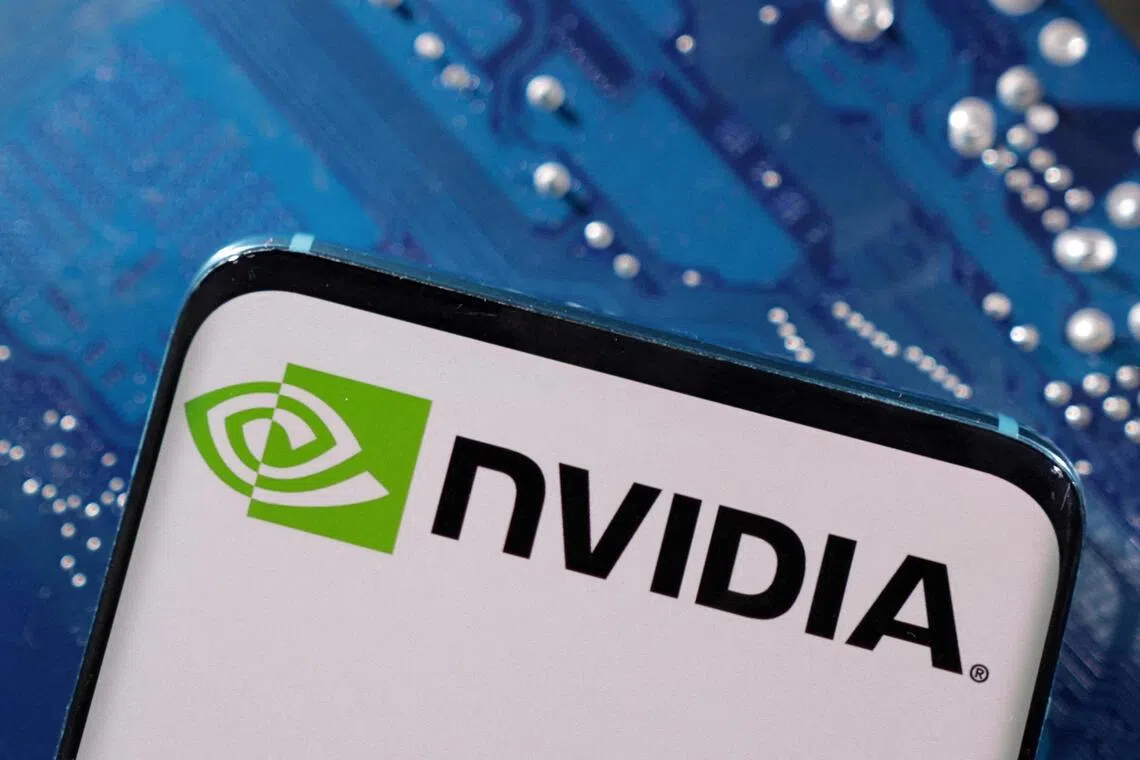China says Nvidia broke anti-monopoly laws, straining trade talks
Sign up now: Get ST's newsletters delivered to your inbox

Nvidia has found itself thrust into the centre of delicate negotiations between Beijing and Washington because of its central role in driving AI.
PHOTO: REUTERS
Follow topic:
BEIJING – China ruled that Nvidia violated anti-monopoly laws with a high-profile 2020 deal, ratcheting up the pressure on Washington during sensitive trade negotiations.
The US chipmaker was found in violation of antitrust regulations after the acquisition of networking gear maker Mellanox Technologies, China’s State Administration for Market Regulation said after concluding a preliminary investigation.
The surprise announcement came as US and Chinese officials headed into a second day of wide-ranging negotiations in Madrid over tariffs
Over the weekend, China also said it was launching an anti-dumping investigation targeting a type of semiconductor made by US companies such as Texas Instruments.
Nvidia’s stock slipped nearly 2 per cent in New York trading on Sept 15 before recouping most of the losses. Shares of Texas Instruments, meanwhile, fell 2.9 per cent.
The Chinese agency did not specify what remedies it would seek from Nvidia, adding that it will investigate the company further.
In its own statement, Nvidia said it complies with the law “in all respects”.
“We will continue to cooperate with all relevant government agencies as they evaluate the impact of export controls on competition in the commercial markets,” the company added.
On Sept 15, US President Donald Trump said he would speak to Chinese leader Xi Jinping on Sept 19 after lower-level negotiations between the two countries.
US Treasury Secretary Scott Bessent said the two sides had discussed the poor timing of the Nvidia investigation, but agreed on a framework to keep ByteDance’s TikTok app running in the US, another long-running conflict between Washington and Beijing.
Nvidia has found itself thrust into the centre of delicate negotiations between Beijing and Washington in 2025, because of its central role in driving future technologies, including artificial intelligence (AI). The company dominates the market for the chips essential to building and operating AI services at companies ranging from Meta Platforms to DeepSeek.
In December, Beijing opened a probe into Nvidia’s acquisition of Mellanox, taking aim at the world’s most valuable company. Beijing gave approval for the US$7 billion (S$9 billion) acquisition deal four years ago, on the condition that Nvidia not discriminate against Chinese companies.
The US government then implemented regulations that banned Nvidia from selling its most advanced AI chips to Chinese companies, including the H100, because of what it called national security concerns. Nvidia redesigned its chips at least twice, so they would comply with US regulations and could be sold in the country.
The Sept 15 initial ruling comes weeks after the Trump administration agreed to allow Nvidia and Advanced Micro Devices to sell some of their sought-after AI chips to Chinese companies. But Beijing has since pushed local companies and agencies to avoid Nvidia’s H20 accelerator, citing security concerns.
It is unclear what impact the Beijing regulator’s announcement would have on talks in Madrid. The first day of negotiations lasted almost six hours, according to a senior Treasury official, spanning topics from TikTok to trade and the global economy.
ByteDance’s popular app faces a deadline this week to reach an agreement to ensure it continues operations in the US.
Officials were also expected to lay the groundwork for a potential in-person meeting between Mr Trump and Mr Xi as soon as October, when they are scheduled to attend a summit in South Korea. BLOOMBERG

